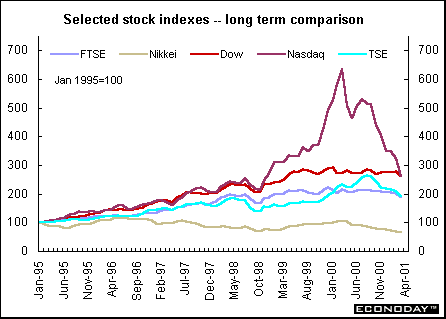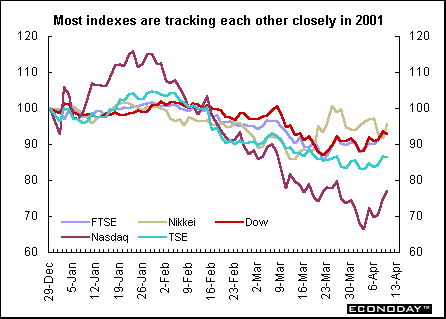With U.S. markets slipping, investors are widening their search for
profitable investments. It is no surprise they are increasingly looking
overseas for alternative investments. Sound investment policy says that
a balanced portfolio, which includes international securities, is best.
A look at key international index behavior compared with U.S. indexes
over recent years is revealing. The indexes included are the London
FTSE, Tokyo Nikkei, Toronto Composite 300, the Dow Industrials and
Nasdaq Composite. The first graph shows the long-term relationship and
the second shows the relative performance since the beginning of 2001.

As exchanges look for
ways to span time zones and offer trading options overseas, many
companies with international exposure have sought stock listings in
their overseas markets to capture investors in all parts of the globe.
This has increasingly led to parallel performances because the same
earnings reports impact several indexes. This is particularly evident
in the current slowdown. The indexes increasingly have been mimicking
and responding to each other in somewhat of a virtuous circle. The
first graph shows how this has increased over time.

As this international
relationship tightens, stock markets are increasingly being driven by
global rather than local factors. Traditionally, investors sought to
reduce risk by diversifying overseas. Globalization by way of expansion
into international markets or by cross border mergers, in combination
with the technology boom, appears to have increased the importance of
world wide factors at the expense of narrower national issues.
Contributing to the trend
is the scrapping of controls on capital, which combined with more
efficient trading systems, has increased international trading. To a
degree, this has created to a single global equity market, even though
many companies are traded on different exchanges. Cross border mergers
and acquisitions and overseas earnings are accounting for a bigger
proportion of many companies' profits, especially high technology
firms. And the Internet has made it easier for investors to get
information on foreign firms.
Does this mean that local data and events are no longer
important? Not at all. While market exuberance and especially revulsion
can be infectious and spread to markets world wide, national events
have maintained their hold on investors' outlooks. The bottom line is
that people still react to what is happening around them and that means
local events do matter. A consumer's job, income, and spending are
ultimately affected by local conditions. And these local conditions
continue to provide the platform for investment. After all, isn't the
global economy in part, a sum of all the national parts?
Anne D. Picker, International Economist, Econoday
|